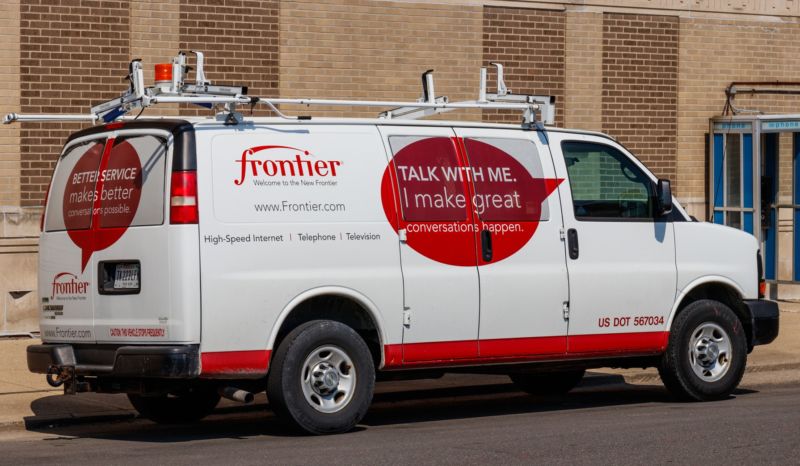
Frontier Communications has agreed to expand its fiber-to-the-premises network and improve its poor service quality as part of a bankruptcy settlement in California. Frontier committed to deploy fiber to 350,000 homes and businesses within six years on a schedule that would require the first 100,000 by the end of 2022, 250,000 by the end of 2024, and the full 350,000 by year-end 2026.
The settlement, filed in late December, is pending approval by the California Public Utilities Commission (CPUC). Frontier agreed to the terms with the Communications Workers of America (CWA), a union that represents Frontier employees; The Utility Reform Network (TURN), a consumer-advocacy group; and Cal Advocates, the public advocate office at CPUC.
To ensure that Frontier doesn’t build only in wealthy areas, the 350,000-location deployment must include 150,000 customer locations where Frontier estimates it would receive less than a 20 percent “internal rate of return.” For those 150,000 locations, Frontier will have to consult with the CWA, TURN, Cal Advocates, and tribal government leaders “to discuss the potential areas for deployment, including tribal lands and tribal communities,” the settlement said.
“As part of the proposed settlement, Frontier will be required to spend at least $1.75 billion over the next four years on service quality and network enhancement projects, as well as provide a detailed plan with input from CWA, TURN and Cal Advocates that identifies needs like plant repair, maintenance, hiring, and how Frontier intends to address them,” the CWA said in a press release last week. The union said it also “secured a commitment from Frontier to maintain its total employee technician staffing in California over the next three years, and to maintain ten call center locations across the state.”
Another settlement clause requires Frontier to spend $11.6 million over four years to deploy 25Mbps download speeds at 4,000 additional locations on tribal lands. The required upload speeds for this buildout are only 2Mbps, so it likely wouldn’t involve fiber-to-the-home. But tribal areas should get some fiber as part of Frontier’s requirement to deploy at 150,000 low “rate of return” areas.
Frontier agreed to temporary price controls, as it “will not increase residential rates for copper-based standalone voice services, fiber-based standalone basic voice service, copper-based broadband services, and copper-based voice/broadband bundles through December 31, 2021,” the settlement said. Frontier will also have to “provide a host of detailed, recurring reports” on network spending, service quality, and broadband commitments to help advocacy groups and the state monitor the company’s compliance.
Frontier failed to invest in fiber
Frontier filed for Chapter 11 bankruptcy in April 2020 after admitting its financial problems were caused in part by “significant under-investment in fiber deployment.” Frontier provides Internet service in 25 states and has a track record of chronic outages, poor customer service, and missing broadband-deployment deadlines after taking government funding. Frontier is aiming to exit bankruptcy early in 2021.
If approved by state officials, the settlement would require Frontier to issue customer credits of $5 a day when outages last more than 24 hours, or $10 a day on tribal lands. That provision would be in effect for three years. Frontier also “agreed to be subject to enhanced penalties in the form of additional investment of up to $7 million per year” if the company fails to meet the state’s service-quality standards.
Frontier also reached a separate settlement with the California Emerging Technology Fund (CETF) that’s geared toward improving broadband access for people with low incomes, tribal residents, and other underserved populations. This includes distributing 20,000 Wi-Fi-capable devices to low-income students by the end of 2021 and expanding eligibility for public Wi-Fi deployments or free broadband at community locations like schools and libraries.
“Frontier has also agreed to continue to offer its Affordable Broadband and Frontier Fundamental low-income broadband service plans at equal or lower pricing than current rates for an additional time period through December 31, 2023,” the settlement with CETF said.
https://arstechnica.com/?p=1733314

